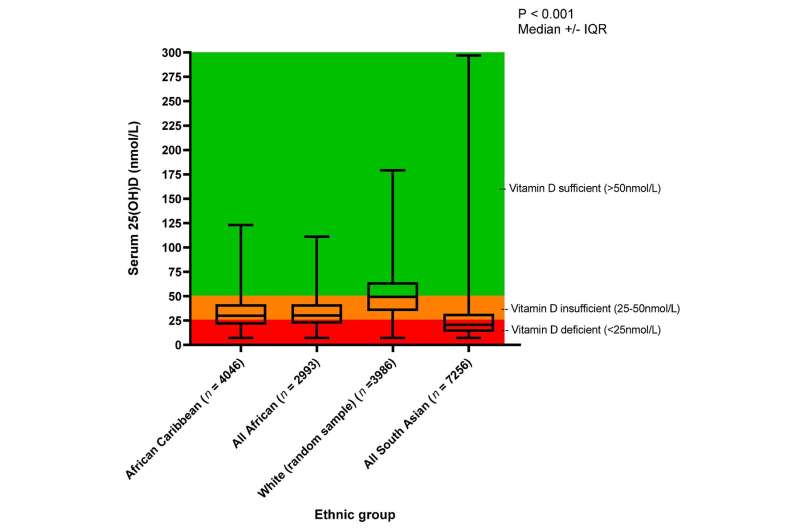The median (IQR) serum 25(OH)D concentration for the African Caribbean (n = 4046), African (n = 2993), White (random sample) (n = 3986) and the South Asian (n = 7256) participants from the UK Biobank. p-Value was analyzed using Kruskal–Wallis H test for African-Caribbean vs. African vs. White vs. South Asian. Credit: 10.3390/nu13114104
Food health experts from the University of Surrey are calling for urgent improvements in public health messaging to address vitamin D deficiency in the UK's ethnic minority community.
Vitamin D is essential for absorbing calcium and has a direct link to bone and immune health. Individuals living in the UK, especially those with darker skin types, are at risk of vitamin D deficiency, especially during the winter months when it is not possible to source vitamin D from the sun.
In a paper published by Nutrients, researchers from the University of Surrey conducted a review of blood levels of vitamin D, as well as vitamin D intake, in members of the UK black community.
The Surrey study aimed to measure levels of vitamin D deficiency in the UK African-Caribbean population through analyzing data from the UK Biobank data set, which contains data on the health and well-being of more than 502,000 individuals.
Dr. Andrea Darling, senior author of the work from the University of Surrey, said, "Our study found that of the 4,046 African Caribbean individuals from the UK Biobank, over 1 out of 3 (37 percent) were vitamin D deficient and in addition to this, over 40 percent had insufficient levels for of vitamin D.
"This is very concerning because we also found that more than 95 percent of the black community population has an insufficient intake of vitamin D.The high levels of deficiency and insufficiency revealed by the study are troubling because of the association between poor vitamin D intake and poor bone and immune health."
The Surrey researchers found that not consuming oily fish, such as salmon and tuna and not taking vitamin D supplements were associated with an increased likelihood of having vitamin D deficiency.
Rebecca Vearing, Ph.D. research student from the Department of Nutritional Sciences at the University of Surrey, said:
"Our findings suggest that there is a need for further public health messaging, especially for ethnic minority groups, to promote vitamin D supplementation and intake of food naturally rich in vitamin D, such as oily fish and eggs, or foods such as breakfast cereals which are fortified with vitamin D."
More information: Rebecca M. Vearing et al, Vitamin D Status of the British African-Caribbean Residents: Analysis of the UK Biobank Cohort, Nutrients (2021). DOI: 10.3390/nu13114104
Provided by University of Surrey





















